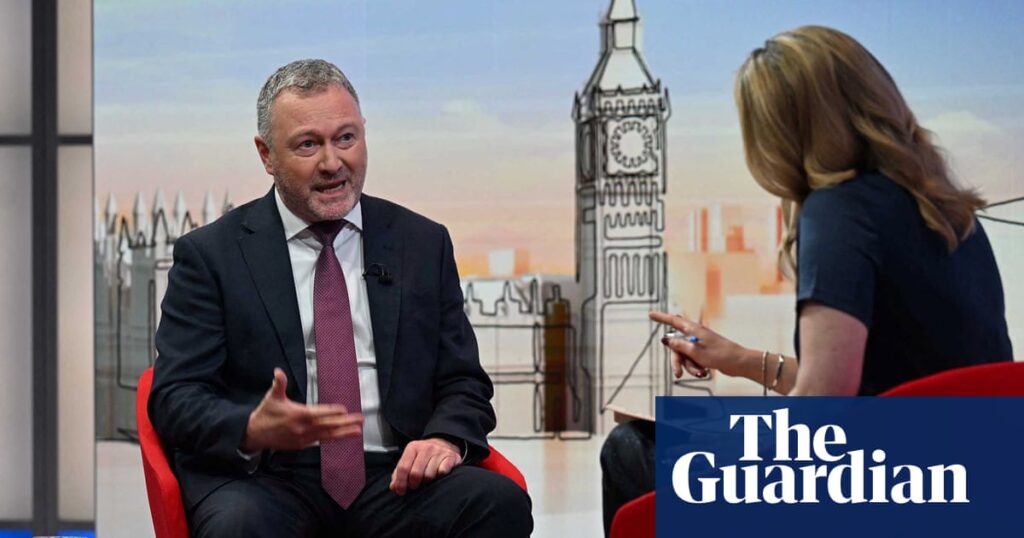The environment secretary, Steve Reed, has said he is “furious” about an average 36% rise in water bills in England and Wales but was unable to rule out further above-inflation increases in future to fix the broken water sector.
Reed said he hoped that “root and branch” reform of the industry would lead to billions of pounds more in investment, which would mean companies would “never again” have to increase bills in the way they did last year.
The average bill will rise by 36% over five years and some will see a price rise of more than 50%. Six water companies have said this is not sufficient to meet the regulator Ofwat’s target and have complained to the Competition and Markets Authority to seek further bill increases.
However, asked by the BBC’s Laura Kuenssberg whether he would allow water companies to increase bills even further, as many have already requested, he said the decision would be up to regulators.
“I‘m furious about the bill rises that we saw last year,” he said. “They happened because of 14 years of failure under the previous government. They could have intervened and made sure that that investment to fix the broken sewage pipes was going in. They didn’t.
“The point is you can learn from the past to improve the future. If you see a crack in the wall of your home and you leave it for 10 years, it gets much more expensive to fix. That’s what happened with our water pipes. Bill payers were made to pay the price of failure.
“I’m furious about that. By changing the whole system, root and branch reform, I can make sure enough money is going in every year that we will never again see that kind of massive bill hike that customers had to pay last year.”
Ministers will this week announce a consultation into creating a new water regulator, with a government-commissioned review expected to confirm on Monday that Ofwat, the watchdog that polices how much water companies can charge for services, will be abolished.
Critics say Ofwat has presided over a culture of underinvestment in water infrastructure and financial mismanagement by water companies since its creation in 1989. Thames Water, the most troubling case for the government and the UK’s largest water company, is loaded with £20bn in debt and struggling to stave off financial collapse.
Reed also told Sky News’s Sunday Morning with Trevor Phillips programme that households expected “a small, steady increase” in water bills rather than massive hikes. “Bills need to be as low as possible,” he said.
There needed to be “appropriate bill rises” to secure “appropriate levels of investment”, he said, adding: “A small, steady increase in bills is what people expect. That’s what happens in most bills that I pay this year.”
Industry leaders have long complained about a lack of coherence in water regulation, with different regulators and agencies doubling up on areas of investigation. This has made it hard to have timely decisions, allowing investigations to drag on rather than prevent or address environmental harm and pollution.
Reed said it was “outrageous” that Southern Water’s chief executive, Lawrence Gosden, was given a pay rise that almost doubled his income, adding that he should have turned it down.
“Trust between the customers and the water companies is at the lowest point probably ever, and by paying their senior executives rises of that kind, what message are they sending to their customers?” he added. “I really would urge them to think about this very, very, very carefully.”
He said he would resign as environment secretary if the government failed to halve sewage pollution in rivers by 2030. “Politicians come and say we’re going to do things. Of course our job should be on the line if we don’t.”
Reed has come under fire from sewage campaigners for announcing targets which they say are no better than those in Ofwat’s plan.
During the price review process, which is the negotiation by the regulator and the water companies about how much bills need to go up to invest in the water sector, Ofwat last year announced the investment from bills would cut sewage spills by 45% from 2021 levels.
Reed announcend that he would cut sewage spills by 50% by 2030 against 2024 levels. However, Ofwat’s goal would reduce sewage spills to 204,893 by 2030, compared to Reed’s which would reduce them to 225,199 by that year.
Defra sources said Reed’s target could be stronger than Ofwat’s because for 2021 storm overflows baseline only 87.8% of overflows were monitored. The 2024 baseline includes 100% monitoring. However, the two figures are largely similar.
The price review process began in 2023, when plans were submitted under the previous Tory government. The £104bn to be invested in fixing England’s creaking sewage infrastructure is coming from a record increase in water bills.
Feargal Sharkey, former Undertones frontman turned sewage campaigner said the targets unveiled on Sunday are actually worse than those Ofwat announced during the price review process.
He told the Guardian: “It’s an act worthy of a Greek tragedy telling your regulator that you’ve come up with a plan that turns out to be worse than the one they come up with a year and a half ago. The government has decided to axe Ofwat while announcing targets which are worse than theirs. Their plan is not worth the paper it’s written on.”


